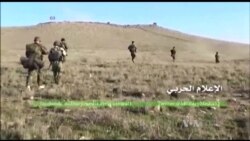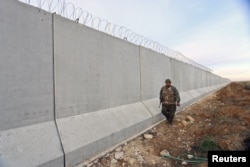Syrian President Bashar al-Assad said Tuesday the cessation of hostilities in his country's five-year war is a "glimmer of hope."
In a German television interview, Assad said his government will do its part to make the truce work.
U.S. Secretary of State John Kerry called the next few days "critical" in building momentum toward the goal of de-escalating the Syrian conflict.
He spoke to reporters Monday evening in Washington as Syria entered its fourth day under a cessation of hostilities that includes pro-government fighters and opposition forces, but not Islamic State militants or those from al-Qaida-linked Jabhat al-Nusra.
Kerry said he and Russian Foreign Minister Sergei Lavrov agree there have been a number of violations since the truce began Saturday, but that they do not want to litigate them publicly. Instead, they will rely on a task force led by their two countries to investigate every reported violation and promote compliance with the halt in fighting.
"This is hard," Kerry said. "But the fact is that we need to stop the cycle of fighting and of bloodshed that is destroying Syria. It is that simple."
The task force monitoring the truce met Monday and Kerry said it will continue to do so regularly.
U.N. Secretary-General Ban Ki-moon also said that despite "some incidents" the cessation of hostilities was largely holding.
U.S. Defense Secretary Ash Carter said "if properly adhered to," the cessation can lead to an overall decline in violence.
"It could be the first step towards a political solution that would end the civil war and the suffering of the Syrian people," he added.
There was a noticeable uptick in violation claims on Monday with Syrian rebels alleging the Assad regime attacked towns and villages they hold 26 times. Seven of the breeches they claimed consisted of barrel bombing by low-flying regime helicopters.
“The regime has continued to target populated areas using helicopter raids using explosive barrels, resulting in a large number of fatalities and causing significant injuries, most of whom were innocent women and children,” Riad Hijab, the rebels’ chief negotiator, complained in a formal letter to the United Nations.
Rebels claim there have been 24 recorded breaches involving regime artillery shelling and five incidents of offensive ground operations.
“Hostilities committed by Russian, Iranian, the Syrian regime, and foreign militias and mercenaries allied to them have continued against the Syrian people despite the truce taking effect on 27 February 2016,” Hijab’s said. He added: “Right from the onset of the truce, a large number of violations have been committed by the regime and its allies in several parts of Syria.”
Rebels claim 26 Russian airstrikes
Hijab said on Sunday Russian fighter jets launched 26 air strikes against territory held by opposition groups which have announced and entered into the truce. “Disturbingly significant is the fact that cluster bombs as well as Thermobaric weapons have been used,” he wrote.
Rebels say a map issued publicly at the start of the truce by the Russian Ministry of Defense detailing the positions of moderate opposition groups is full of errors. They are urging the U.N. to draw up a separate map.
Russian monitors Sunday said they have recorded nine violations of the truce, attributing most to the rebels.
Meanwhile, the U.N. and aid partners began deliveries Monday in hopes of reaching more than 150,000 Syrians in besieged areas.
The U.N.'s humanitarian coordinator for Syria, Yacoub El Hillo, said the shipments are scheduled for multiple areas across Syria through Friday.
"It is the best opportunity that the Syrian people have had over the last five years for lasting peace and stability," he said.
U.N. envoy for Syria Staffan de Mistura said he will reconvene intra-Syrian peace talks in Geneva on March 9, two days later than the original target date. The delay was needed to "allow adequate time to address logistical and practical matters," a U.N. spokesman said.
United Nations correspondent Margaret Besheer and Jamie Dettmer contributed to this report .








